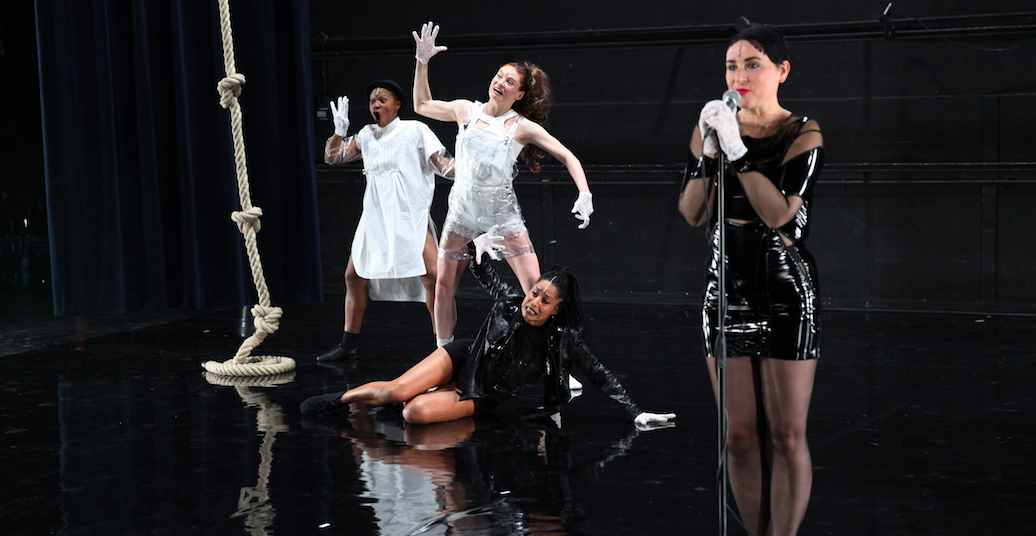With “Water Will (in Melody)”, Ligia Lewis presents a different kind of pre-Christmas fairytale in HAU2. Her grim, grotesque movement theater takes the audience on a ride to a dystopian future world where women reside as freaky artifacts of a bygone era. We don’t really want that.
Darkness. The sound frames a nocturnal forest. A screeching owl hoots, frogs croak in an imaginary pool of water. In a flashlight-spotlight, a female creature runs uneasily and with distorted movements back and forth across the stage. A hybrid somewhere between human, animal, and avatar whose crunching plastic body holds captive an undelivered soul. Whether this futuristic revenant is guided remotely or by instinct remains unknown. However, it is quite obvious that she has trouble transmitting information: in a chilling tone, she tells Grimm’s tale of a capricious (female) child. With impulsive naiveté, the narrative logic is suddenly interrupted with sentences like “Can you see the waterfall?”. Thus, with a cheeky wink, Lewis attributes something to the feminine, which is hardly unfamiliar to classical dance history: the allegedly weak sex is inclined to stray from the straight path of Christian virtue. Clearly, the female must be kept in check with moral admonishment.
In well-known traditional ballet classics, defiant young female figures are gladly transformed into light-footed sprites with an affinity for water and woods. Lewis, on the contrary, does not rely on ethereal transmutation. Instead, she stages herself and her three performers as explicit deviations from the norm, as women in latex and leather (Susanne Sachsse und Ligia Lewis), in an asylum nightgown and nightcap (Titilayo Adebayo), and in a futuristic girly outfit (Dani Brown). The effect of these sympathetic, exaggeratedly portrayed freaks with sex appeal is similar to that of those man-eating revenants hidden under the cloak of the ethereal. Not quite from this world. Their relationship to everything sensual is strangely detached and cool, even though they articulate themselves with forceful gestures. On a stage akin to a cellar and meant to be interpreted as limbo with a chance of redemption (a knotted rope indicates the way up), they writhe like a living relief. Eyes and mouths hideously agape – the transformation from heathen elves into Christian witches scientifically explored –, powerless in the face of an invisible, superior entity.
As the piece progresses, the tragedies of the historically ascribed feminine are pried out and deconstructed with the expectable, but overdue melodramatics. As a divine clone, Susanne Schwarz recites the aforementioned Grimm fairytale in German, with meaning but emotionally detached, and then guiltily raises her hand and mechanically scratches her nether regions. A few scenes later, she goes towards the audience only to backtrack: “I will stand up against your will” … “I’m sorry, I made a mistake”. The rest of the performers also waver between self-confidence and self-dissolution: “I’m leaving the frame” and “I’m losing form”. The female images that Lewis is seizing on here — and the ironic distance and dissociation mechanisms make this apparent — are also always stereotypes and practiced roles.
In a two-part intermezzo, which employs a number of melodramatic genres, the performers’ breakdown is conveyed to the theater apparatus, and the boundaries between reality and fiction are shattered on an even higher level. In a kind of momentary madness and without any transmission difficulties, the three performers suddenly start dancing fluidly and powerfully to the song “Fade Away” and satisfy the (supposedly) immaculate feminine by, as is wont (?), operating impeccably and flawlessly. There is a blackout on the side stage. The audience is allowed to eavesdrop on opera music pregnant with significance in solemnly circling and bright floodlights. A scene from a film soundtrack follows, one that uses murmuring waves and appropriate music to acoustically hint at disaster. In the semi-darkness, you can make out one of the performers, Ligia Lewis, stranded at the edge of the stage. She is talking about the “creatures of the lake” and darkness. The birth of the spirit (which originally represents the concept of masculinity) from the water (mythologically feminine and associated with chaos and formlessness) follows.
The myth of the unfathomable female finds a certain terra incognita on the stage, one that is increasingly immersed in an artificial mist. The cellar from the first part of the piece has turned into a vault, a grotto: “Pandora. Pandora’s aquarium …”. The performers speak in whispers to themselves, they wander across the stage. They literally appear macerated, their movements becoming less mechanical, more human, they laugh, they are almost silly, they lie on top of each other. In another scene, they look up and beyond the audience. It almost seems as if there is a faint shimmer of hope. As the stage transforms into an imaginary cave with suspended panels of cloth and dripping sounds, Titilayo Adebayo stands with her back to the audience. Tonight she is donning a black bowler hat and a kind of asylum nightgown. In this getup, she takes small jumps in a natural water drop rhythm: “I can hardly see the road. So I ask a question … Lord … I were complaining … I were complaining … I were complaining …” Blackout?! There is no heavenly response resounding from offstage. However, will is bound to the skill of execution, and signifies the transmission from perceptions into reality. Ligia Lewis interrupts the hopping and exits the stage with clear and determined strides. She’s leaving the (patriarchal) frame. It is in no way insane, but it is pretty self-confident.
English Translation by Melissa Maldonado




